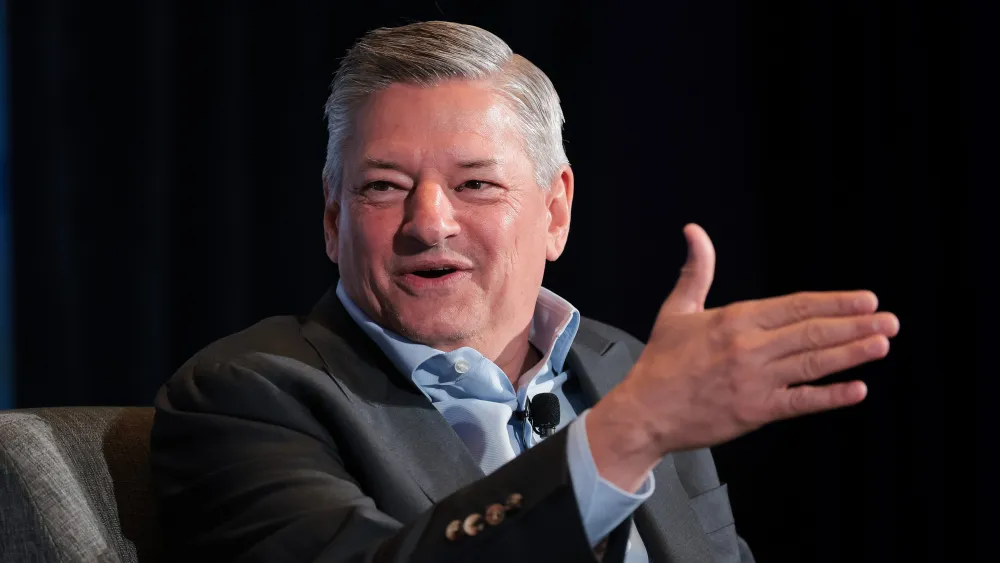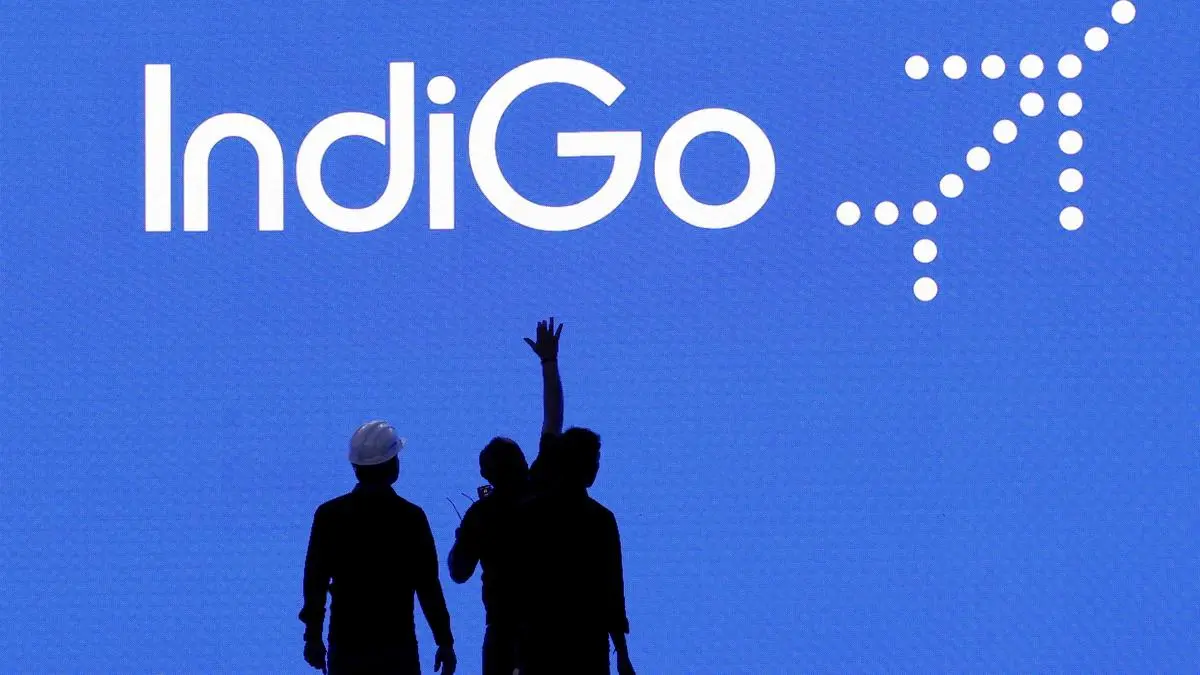
Ted Sarandos is co-CEO of Netflix, the biggest premium subscription streaming company on the planet, with a current market capitalization of more than $500 billion.
But more than two decades ago, before the dawn of video streaming, Sarandos was more than a little skeptical when he first met with Reed Hastings and heard the Netflix co-founder’s vision of home entertainment shifting to internet delivery.
“Honestly, it sounded nuts to me,” said Sarandos, who shared his earliest recollections of Netflix and more on the latest episode of the “Aspire With Emma Grede” podcast.
It was October 1999 when Sarandos and Hastings first met, and Sarandos — who was then an exec at video-rental chain West Coast Video — was interviewing for a job at Netflix to procure DVDs for the disc-by-mail service.
“Reid said all entertainment is gonna come into the home on the internet,” Sarandos said. “Now, at this time, no entertainment came into the home on the internet. It was too slow and too expensive.” After Sarandos pushed back on the idea, Hastings said, “No. In fact, if you think you’re still gonna be getting your entertainment on cable, you should not only don’t take this job — don’t buy my stock when I go public.”
“So he laid this out,” Sarandos continued. “I wasn’t even sure I believed him, to be honest with you. But I thought that this guy, this is the kind of person who changes the world in some dimension.”
Sarandos, of course, accepted the job offer and started in 2000 as VP of product and head of content operations. He had caught Hastings’ eye after the Netflix chief learned that at West Coast Video, Sarandos had cut revenue-sharing agreements with Warner Bros. and Sony. “Reid read about it and he said, ‘I need that deal.’”
“We were buying movies, by the way, on DVD from Walmart when I first joined the company,” Sarandos said. “People would go to Best Buy and buy inventory. So my goal when I came in, it was to get direct [deals] with the studios.”
After Netflix launched streaming in 2007, Sarandos noted, “One thing we did not have was new movies. Back then, the pay-TV deals would lock up movies for years. So basically you couldn’t license a movie that played in the theater for a service like Netflix for 10 years after theater. So we were always constantly, anytime a movie was in the wild, which would happen every once in a while, we would take the meeting and try to do it.”
Sarandos led Netflix’s foray into original content, which included series “House of Cards,” a pickup of “Arrested Development” and “Orange Is the New Black.” He recalled how he won the $100 million deal with the producers of the U.S. adaptation of “House of Cards,” which Kevin Spacey and Robin Wright were attached to along with David Fincher in the director’s first TV show. “There’s a thousand reasons to say no… What’s the one path to yes? I gave them a two-season order with no notes. We promised them no creative interference,” Sarandos recalled. “That was big at that time. It would be very rare to even go direct to series, let alone, you know, a two-season pickup.”
Sarandos said Netflix uses “data-informed intuition” in greenlighting decisions. “We have to be very careful of not looking for the data to confirm our intuition, but just saying actually the opposite,” he said. “You know, it’s kind of one of our core culture things at Netflix — this farming for dissent.”
As he became immersed in Hollywood, Sarandos said he came to understand “that this is really a trust business. You know, people do not want to make a bad call on their watch. So the more you know them, the better. And so it’s very much a relationship business.”
Netflix in 2020 elevated Sarandos to be co-CEO alongside Hastings. Early on, Hastings had told him, “I’m gonna build a company that’s gonna be around way after me,” indicating that Hastings had succession planning on his mind for years. “He brought me on as a co-CEO, which is unheard of for a founder,” said Sarandos.
In 2023, Hasting stepped down as co-CEO and the company named then-COO Greg Peters to the role, paired with Sarandos. “I don’t think the co-CEO model is for everybody,” Sarandos said. “But for our business, it works really well. And Greg and I have this relationship similar to what Reid and I had, in that our focus is on our deep expertise.”
These days, Sarandos said, he speaks to Hastings, who serves as chairman of Netflix, “all the time”: “It’s a great safety net [to be able to say], ‘Hey, we’re thinking about this. What do you think about this?’”
On the podcast, Grede, who is the founding partner and chief product officer of Kim Kardadhian’s Skims, asked Sarandos a loaded question: Has Netflix saved Hollywood or ruined it?
Sarandos responded with a “self-serving answer. I think it’s saving [the entertainment industry]. A lot of people get wrapped up in the idea of how things used to be. And there’s something to that. There’s something great about what inspired me to do what I’m doing now, [which] is that stuff that I watched when I was young. So for me it’s like, yeah, if people now would like to stay home and watch movies on Friday night instead of going to the theater — let’s meet the customer where they are and make great movies for them.” According to Sarandos, when people say Netflix has “ruined” Hollywood, they are talking “very narrowly” about their local movie theater closing down. “That wasn’t because of Netflix,” he said, but “because people’s behavior changed.”
About AI’s impact on entertainment, Sarandos reiterated comments he’s made previously, which is that technology should serve to enhance the creative process. “AI isn’t replacing storytellers — it’s creating tools that empower them to tell stories they never could before,” he said. “It’s creating tools for filmmakers that empower them to tell what stories they never could tell before.” Sarandos added, “Is it ever good business to make a $300 million or $400 million movie if the monetization model isn’t moving faster? And these tools can do a very similar thing for a more controllable price.”
On balancing the tech and entertainment sides of Netflix, Sarandos said, “I knew early on that we couldn’t just jam the two cultures together, and Reid recognized that right away. One memorable day in Netflix history, I wanted everyone up in Los Gatos [at its headquarters] to experience what happens in L.A. So I brought the whole team down, we toured the Warner Bros. studio, and I rented the Improv. I asked Naomi Odenkirk — Bob Odenkirk’s wife, who was a talent booker then — to line up 10 great comedians,” which included Zach Galifianakis, Sarah Silverman and Patton Oswalt. “It made such an impression that people talked about it for a year afterward,” according to Sarandos.
As a teen, Sarandos said, he had wanted to a be journalist. But one day when he was compiling his clips, “I realized I wasn’t a very good writer and no one ever told me,” he said. But he also loved movies — and at the time he was working a part-time job at a video rental store, which turned out to be the launching pad for his career.
When he was growing up in Phoenix, Sarandos said, it was “chaotic in my house all the time,” with his parents having had four children in their 20s. For example, he said, the kids didn’t have a set bedtime. TV, by contrast, had a structure: “‘Happy Days’ was on at 7 o’clock and channel three every Tuesday night.”
Sarandos also shared that he would stay up late with his mother and watch “The Tonight Show Starring Johnny Carson.” “And she would always talk about celebrities on a first-name basis. It wasn’t Carson. It was Johnny. ‘Oh, can you believe Johnny last night?’”
Said Sarandos, “I always thought we were poor. And it turns out my mom was just really bad with money… My dad made money and she just blew it… We may not have the electricity and the gas on at the same time. We might get evicted from the house, but we had a VCR before anyone else did, like that kind of thing.”
When he was 10 years old, Sarandos’ parents went to Las Vegas for Labor Day weekend — and they dropped him off by himself to watch the Jerry Lewis telethon benefiting the Muscular Dystrophy Association when it broadcast live from a hotel on the Strip. “You get in line and you go back through for 24 hours. Ten years old alone in Las Vegas going to this thing,” said Sarandos, who is 61. “Now, because of that, I saw Johnny Carson, I saw George Burns, I saw all these people who had such an enormous influence on my life and what I wanted to do, and that built my passion for entertainment in so many ways. Because of my parents being kind of reckless, it exposed me to things that I wouldn’t have otherwise ever had the opportunity to see and know.”
Grede’s “Aspire” podcast is produced and distributed in partnership with Audacy. In addition to Skims, she is CEO and co-founder of Khloe Kardashian’s Good American apparel brand. The British entrepreneur also is the first Black woman to serve as an investor on “Shark Tank.”



